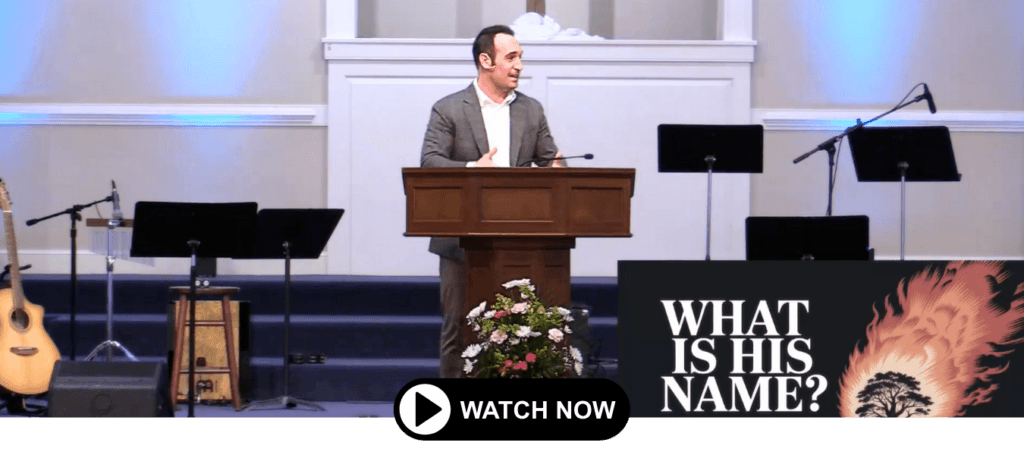
Reading
- Exodus 3:11-15
- John 1:1
- Genesis 22:14
- Exodus 15:26
- Exodus 17:15
- Judges 6:24
- Leviticus 20:8
- Jeremiah 23:6
- Ezekiel 48:35
- Psalm 23:1
Warm Up
- Reflect on a time when you felt uncertain about a task or challenge. How did you find the strength to move forward?
- What names or attributes of God are most meaningful to you, and why?
Scripture Exploration
- Read Exodus 3:11-15. What questions does Moses ask God, and how does God respond?
- How does the concept of “I AM” in Exodus 3:14 relate to God’s eternal nature?
- What do the names Jehovah Jireh, Jehovah Rophi, and Jehovah Nissi reveal about God’s character?
Personal Reflection
- How does understanding God as “I AM” influence your perception of His presence in your life?
- Cross-reference John 1:1. How does this passage affirm the truths found in Exodus 3:14?
- Discuss the theological significance of God being self-existent and eternal. What does this mean for your faith?
Personal Application
- In what ways can you rely on God’s strength in your current life situation?
- How can you incorporate the understanding of God as “I AM” into your daily prayer or meditation practices?
- Identify one area in your life where you need to trust in God’s eternal and unchanging nature. What steps can you take this week to demonstrate that trust?
- As a community, how can your group support each other in recognizing and celebrating the attributes of God discussed in the sermon?
Dive Deeper
What is His Name? (Exodus 3:15)
In a world constantly changing, where trends and cultures shift with time, the constancy of God remains a profound source of comfort and strength. The sermon, titled “What is His Name?” based on Exodus 3:15, delves into the eternal nature of God and His personal relationship with humanity.
The Call of Moses
The narrative begins with Moses, a fugitive and shepherd, encountering God through a burning bush that is not consumed. This miraculous event marks the beginning of God’s plan to deliver the Israelites from Egypt, as described in Exodus 3:11-15. Moses, feeling inadequate, questions his role and God’s plan, asking, “Who am I?” and “What is His name?” God’s response, “I am who I am,” reveals His eternal, self-existent nature.
Understanding “I AM”
The term “I AM” signifies God’s eternal presence and unchanging nature. Unlike the ever-shifting world around us, God remains constant. This concept is echoed in the New Testament, where Jesus uses “I AM” statements to describe His divine nature, linking back to the God of Moses.
- Exodus 3:14: “God said to Moses, ‘I am who I am.'”
- John 1:1: “In the beginning was the Word, and the Word was with God, and the Word was God.”
God’s Eternal Nature
God’s self-existence means He is not dependent on anything or anyone. He is the source of all life, the uncaused cause. This theological concept, known as “aseity,” emphasizes God’s independence from His creation. His eternal nature assures us that He is the same yesterday, today, and forever, as highlighted in Hebrews 13:8 and Malachi 3:6.
God’s Personal Relationship
Despite His grandeur, God is personal and relational. He hears the cries of His people and acts on their behalf, as seen in Exodus 3:7. His covenant with Israel demonstrates His commitment to His chosen people, a relationship that continues through the generations.
- Exodus 3:15: “The Lord, the God of your fathers, the God of Abraham, the God of Isaac, and the God of Jacob has sent me to you.”
Trusting in God’s Plan
In moments of uncertainty, we are reminded of God’s sovereignty and faithfulness. He is the “I AM” who provides, heals, and fights for His people. The sermon draws parallels with various names of God found throughout the Bible, such as Jehovah Jireh, Jehovah Rophi, and Jehovah Shalom, each reflecting different aspects of His character and His promises to His people.
Conclusion
The sermon concludes by urging believers to shift their focus from themselves to God. By understanding who God is, we gain clarity on who we are and what He calls us to do. As we embark on a journey through the “I AM” statements in the book of John, we are invited to deepen our understanding of God’s eternal presence in our lives.
In summary, the message of “What is His Name?” calls us to recognize the unchanging nature of God and His personal involvement in our lives. It challenges us to trust in His eternal promises, knowing that He is the same God who has been faithful throughout history and will continue to be so in our lives today.